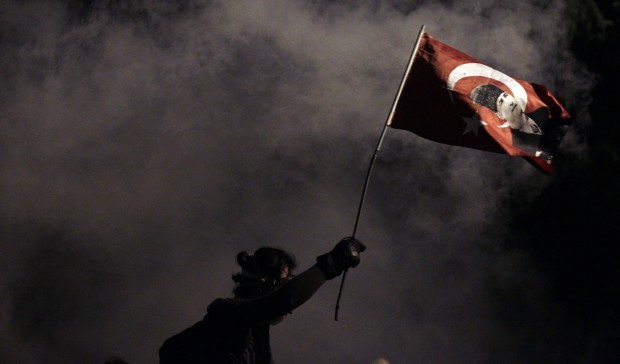
A protester holding a Turkish flag decorated with the image of former leader Mustafa Kemal Atatürk, during clashes near Taksim Square in Istanbul, late on Monday, June 3, 2013. (AP Photo/Kostas Tsironis)
Istanbul/Rabat, Asharq Al-Awsat—Turkish Prime Minister Recep Tayyip Erdoğan has accused “foreign” parties and “extremists” of being behind the ongoing protests in Turkey.
Speaking before his departure on an official state visit to Morocco, Erdoğan told journalists: “There are those attending these events organised by extremists. This is not about Gezi Park anymore. These are organised events with affiliations both within Turkey and abroad.”
“The main opposition Republic People’s Party (CHP) has provoked my innocent citizens. Those who make news [and] call these events the ‘Turkish Spring’ do not know Turkey,” he said.
The Turkish prime minister emphasized: “We already have a spring in Turkey … but there are those who want to turn this spring into winter,” adding, “be calm, this will all pass.”
Sources close to Erdoğan, speaking to Asharq Al-Awsat on the condition of anonymity, claimed that Turkish intelligence has evidence linking foreign intelligence agencies to the protests.
CHP leader Kemal Kılıçdaroğlu held an urgent meeting with Turkish president Abdullah Gül yesterday afternoon. Sources informed Asharq Al-Awsat that the president asked the opposition leader to help bring calm to the streets.
The CHP has denied any involvement in the protests, blaming Erdoğan’s policies for the unrest. Senior CHP member, Mehmet Akif Hamzaçebi, said: “The people in the streets all over Turkey are not all members of the CHP; they belong to all ideologies and parties.”
President Gül has taken a softer stance than Erdoğan, calling on protesters “to abide by the rules and state their objections and views in a peaceful way, as they have already done.”
“The messages delivered with good intentions have been received,” he added.
In what has been viewed by many as a criticism of Erdoğan’s hard-line tactics with the protesters, President Gül was quoted as saying: “When we talk about a democracy, we of course mean the expression of the will of the people in electing the leaders of the country. But democracy does not just mean elections. It is natural that outside of elections, if there are differing opinions, situations or objections, that they be voiced. And peaceful protests are a part of that.”
In addition to the deteriorating security situation in Istanbul, Turkey’s main stock exchange dropped 10.5% as investors reacted to the unprecedented protests. Despite the economic, political and security threats to his country, Prime Minister Erdoğan flew to Morocco as part of a previously scheduled tour of the Maghreb region. He was accompanied by government ministers and Turkish businessmen.
Erdoğan held talks with Moroccan prime minister Abdelilah Benkirane and was scheduled to attend a meeting with the Moroccan foreign minister to sign a number of bilateral agreements.
Idris Boano, a member of the Moroccan Justice and Development Party’s foreign affairs committee specializing in Turkish affairs, told Asharq Al-Awsat: “This visit is of great importance in the strategic relations between our two countries. It also represents an endorsement of the path of Moroccan reforms, which is largely similar to the Turkish one.”
Boano claimed that both the Turkish and Moroccan Justice and Development parties share the same vision, which aims to implement reform within a framework of stability.
“When the Justice and Development Party came to power in Turkey, the country had been going through a stifling economic crisis with unprecedented levels of inflation and unemployment, but the party managed to lead Turkey out of the crisis and turned it into an economic power…. We look forward to benefiting from this experience.”

Trackbacks/Pingbacks